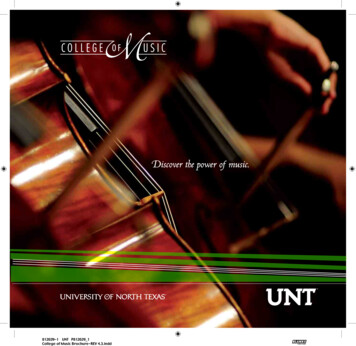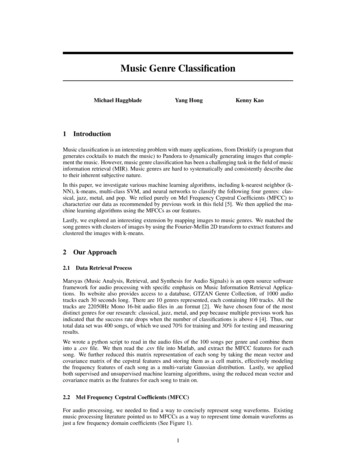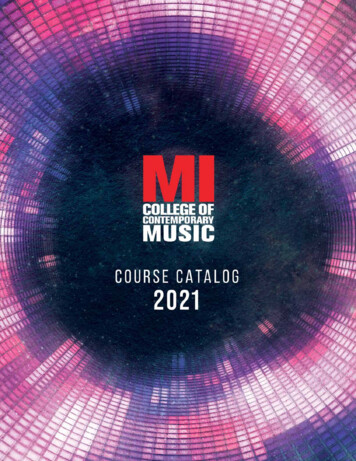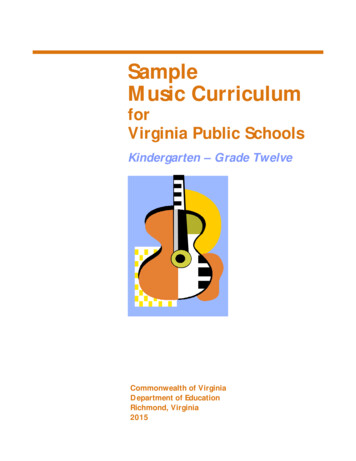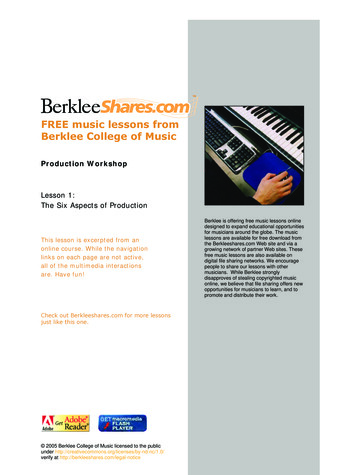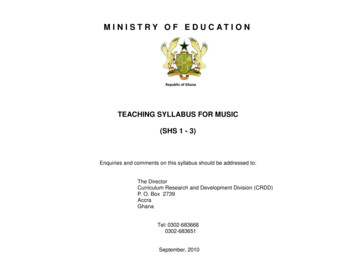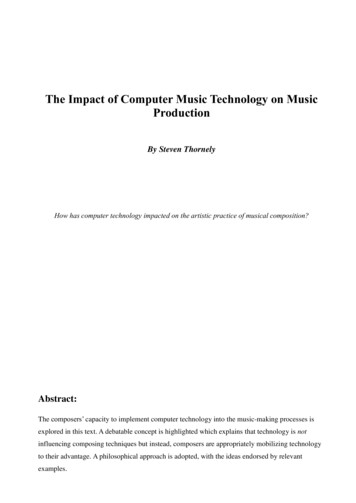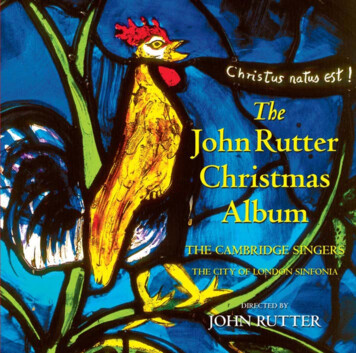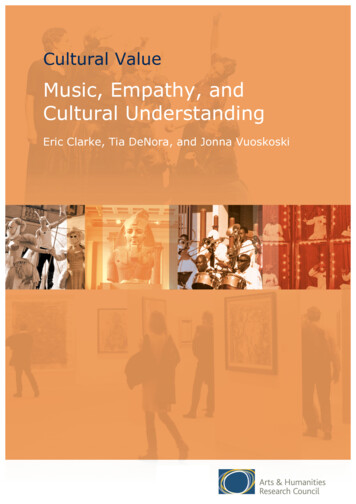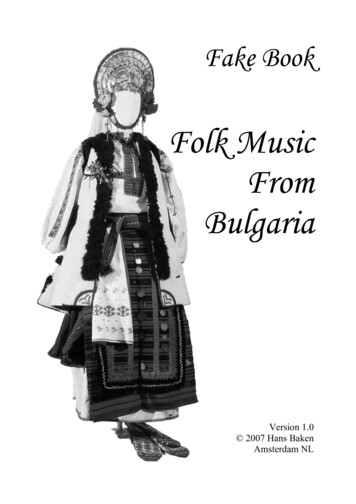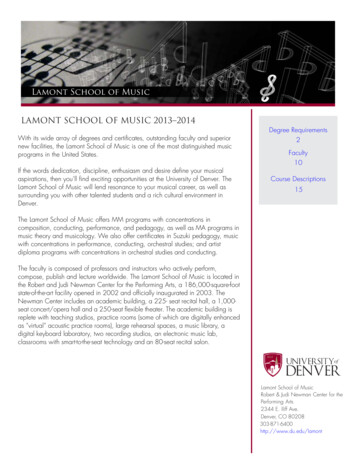
Transcription
Lamont School of MusicLAMONT SCHOOL OF MUSIC 2013–2014With its wide array of degrees and certificates, outstanding faculty and superiornew facilities, the Lamont School of Music is one of the most distinguished musicprograms in the United States.If the words dedication, discipline, enthusiasm and desire define your musicalaspirations, then you’ll find exciting opportunities at the University of Denver. TheLamont School of Music will lend resonance to your musical career, as well assurrounding you with other talented students and a rich cultural environment inDenver.Degree Requirements2Faculty10Course Descriptions15The Lamont School of Music offers MM programs with concentrations incomposition, conducting, performance, and pedagogy, as well as MA programs inmusic theory and musicology. We also offer certificates in Suzuki pedagogy, musicwith concentrations in performance, conducting, orchestral studies; and artistdiploma programs with concentrations in orchestral studies and conducting.The faculty is composed of professors and instructors who actively perform,compose, publish and lecture worldwide. The Lamont School of Music is located inthe Robert and Judi Newman Center for the Performing Arts, a 186,000-square-footstate-of-the-art facility opened in 2002 and officially inaugurated in 2003. TheNewman Center includes an academic building, a 225- seat recital hall, a 1,000seat concert/opera hall and a 250-seat flexible theater. The academic building isreplete with teaching studios, practice rooms (some of which are digitally enhancedas “virtual” acoustic practice rooms), large rehearsal spaces, a music library, adigital keyboard laboratory, two recording studios, an electronic music lab,classrooms with smart-to-the-seat technology and an 80-seat recital salon.Lamont School of MusicRobert & Judi Newman Center for thePerforming Arts2344 E. Iliff Ave.Denver, CO 80208303-871-6400http://www.du.edu/lamont
DEGREE REQUIREMENTSMaster of Arts in MusicologyCourse RequirementsTotal Quarter Hours - 45 hrs.Concentration AreaMusicology courses (16 hrs.)Thesis Research (5 hrs.)Other Studies in MusicIntroduction to Graduate Study in Music (4 hrs.)Music theory courses (8 hrs.)ElectivesMUAC, MUPR and/or MUEN course(s) (4 hrs.)Courses in areas outside of music (8 hrs.)Other RequirementsToolAbility to read relevant music-based documents in atleast one Western language other than English, asdemonstrated by completion of at least two years ofstudy of that language at the college level or alanguage tool examination in that languageThesisA thesis that constitutes an original contribution ofresearch to the fieldMaster of Arts in Music TheoryCourse RequirementsTotal Quarter Hours - 45 hrs.Concentration AreaMusic Theory courses (12 hrs.)Thesis Research (5 hrs.)Other Studies in MusicIntroduction to Graduate Study in Music (4 hrs.)Musicology courses (8 hrs.)ElectivesCourses at the 3000- and/or 4000-level (16 hrs.), ofwhich no more than 8 hrs. may be in areas outside ofmusic and all of which must be approved by the MusicTheory Department ChairOther RequirementsThesisA thesis that constitutes an original contribution ofresearch to the fieldFinal ExaminationOral comprehensive final examination, includingdefense of the thesisFinal ExaminationsWritten comprehensive final examinationOral comprehensive final examination, includingdefense of the thesisUNIVERSITY OF DENVER2
DEGREE REQUIREMENTS (continued)Master of Music in CompositionCourse RequirementsTotal Quarter Hours - 50 hrs.Concentration Area Non-Jazz EmphasisStudio composition (12 hrs.)Courses in Music Theory (12 hrs.)Composition Seminar (6 hrs.) Jazz EmphasisStudio composition (12 hrs.)Courses from the Jazz and Commercial Musiccurriculum, selected in consultation with thestudent’s adviser (12 hrs.)Other Studies in MusicIntroduction to Graduate Study in Music (4 hrs.)Musicology course (4 hrs.)Music theory course (4 hrs.)ElectivesMUAC, MUPR, MUEN, and/or non-music courses,of which 4 hrs. must be in musicology, music theory,or composition; no more than 4 hrs. may be inperformance; and no more than 4 hrs. may beoutside of music (these hours must include TonalCounterpoint if the equivalents was not completedduring undergraduate study) (8 hrs.)Other RequirementsRecitalSubmission of at least one composition for every endof- quarter new music concertFinal Examination Non-Jazz EmphasisWritten comprehensive final examination Oralcomprehensive final examination Jazz EmphasisOral comprehensive final examinationMaster of Music in ConductingCourse RequirementsTotal Quarter Hours - 50 hrs.Concentration AreaConducting Tutorial (12 hrs.)Other courses (12 hrs.) Choral EmphasisAdvanced Orchestral Conducting (2 hrs.)Advanced Wind Conducting (2 hrs.)Choral Pedagogy or Vocal Pedagogy (4 hrs.)Choral Literature (4 hrs.) Orchestral EmphasisAdvanced Choral Conducting (2 hrs.)Advanced Wind Conducting (2 hrs.)Movement course (4 hrs.)Orchestral literature course (4 hrs.) Wind EmphasisAdvanced Orchestral Conducting (2 hrs.)Advanced Choral Conducting (2 hrs.)Movement course (4 hrs.)Advanced Wind Literature (4 hrs.)Other Studies in MusicIntroduction to Graduate Study in Music (4 hrs.)Musicology course (4 hrs.)Music theory course (4 hrs.)Ensemble courses (6 hrs.) Choral EmphasisChorale (6 hrs.) Orchestral EmphasisSymphony Orchestra (6 hrs.) Wind EmphasisWind Ensemble (6 hrs.)ElectivesMUAC, MUPR, MUEN, and/or non-music courses, ofwhich 4 hrs. must be in musicology, music theory, orcomposition; no more than 4 hrs. may be inperformance; and no more than 4 hrs. may be outsideof music. (8 hrs.)UNIVERSITY OF DENVER3
DEGREE REQUIREMENTS (continued)Other RequirementsEnsemble ParticipationParticipation in at least one major ensemble eachquarter, whether or not it is taken for creditRecitalOne full-length conducting recitalFinal ExaminationWritten comprehensive final examination oralcomprehensive final examinationMaster of Music in PedagogyCourse RequirementsTotal Quarter HoursCello (Suzuki) and Violin (Suzuki) Pedagogy Emphases- 55 hrs.Piano Pedagogy Emphasis - 59 hrs.Concentration AreaStudio performance (12 hrs.)Pedagogy courses Cello (Suzuki) and Violin (Suzuki) PedagogyEmphases - (17 hrs.)Suzuki Seminar I/II (12 hrs.)Teaching Note Reading (2 hrs.)Suzuki Practicum (3 hrs.) Piano Pedagogy Emphasis (21 hrs.)Professional Foundations in Music Education/PianoPedagogy (6 hrs.)Introduction to Research in Music Education(2 hrs.)Three of the following Seminars in Piano Pedagogy(6 hrs.) Preschool Children (2 hrs.) Elementary-Level Children (2 hrs.) Intermediate-Level Children (2 hrs.) Elementary/Intermediate-Level Adults(2 hrs.) Advanced Students (2 hrs.)Piano Teaching Practicum (3 hrs.)Thesis Research (4 hrs.)Other Studies in MusicIntroduction to Graduate Study in Music (4 hrs.)Musicology course (4 hrs.)Music theory course (4 hrs.)Ensemble courses (6 hrs.) Cello (Suzuki) and Violin (Suzuki) PedagogyEmphases Ensemble courses (6 hrs.) Piano Pedagogy Emphasis Piano Accompanying (6hrs.)ElectivesMUAC, MUPR, MUEN, and/or non-music courses, ofwhich 4 hrs. must be in musicology, music theory, orcomposition; no more than 4 hrs. may be inperformance; and no more than 4 hrs. may be outsideof music. (8 hrs.)UNIVERSITY OF DENVER4
DEGREE REQUIREMENTS (continued)Other RequirementsEnsemble Participation Cello (Suzuki) and Violin (Suzuki) PedagogyEmphasesParticipation in at least two major ensembleseach quarter, whether or not they are takenfor credit Piano Pedagogy EmphasisParticipation in the piano accompanyingprogram each quarter, whether or not it istaken for credit toward the ensemblerequirement listed above under courserequirements. An accompanying load that isequivalent to participation in two majorensembles will be determined by thecoordinator of the program.RecitalOne full-length performance recitalThesis Cello (Suzuki) and Violin (Suzuki) PedagogyEmphasesN/A Piano Pedagogy EmphasisA thesis that constitutes an original contributionof research to the fieldFinal ExaminationFinal teaching demonstrationFinal oral comprehensive examination Cello (Suzuki) and Violin (Suzuki) PedagogyEmphasesFinal oral comprehensive examination Piano Pedagogy EmphasisFinal oral comprehensive examination,including defense of the thesisMaster of Music in PerformanceCourse RequirementsTotal Quarter Hours - 50 hrs.Concentration AreaStudio performance (12 hrs.)Other courses (18 hrs.) Accordion, Bassoon, Clarinet, Flute, Harp, Oboe,Percussion, Saxophone EmphasesPedagogy and Repertoire (8 hrs.)Area electives (4 hrs.)Ensemble courses (6 hrs.) Carillon EmphasisCarillon Repertoire (8 hrs.)Carillon History and Mechanics (4 hrs.)Ensemble courses (6 hrs.) Cello EmphasisPedagogy and Repertoire or Suzuki PedagogySeminar I (4 hrs.)Orchestral Excerpts or Suzuki Pedagogy SeminarI/II (4 hrs.)Area electives (4 hrs.)Ensemble courses (6 hrs.) Double Bass EmphasisPedagogy and Repertoire (4 hrs.)Orchestral Excerpts (4 hrs.)Area electives (4 hrs.)Ensemble courses (6 hrs.) French Horn, Trombone, Trumpet, and TubaEmphasesPedagogy and Repertoire (4 hrs.)Professional Brass Techniques (4 hrs.)Area electives (4 hrs.)Ensemble courses (6 hrs.) Guitar EmphasisPedagogy and Repertoire (8 hrs.) or AdvancedRepertoire (6 hrs.)Area electives; 4 hrs. if Pedagogy and Repertoiretaken; 6 hrs. if Advanced Repertoire takenEnsemble courses (6 hrs.)UNIVERSITY OF DENVER5
DEGREE REQUIREMENTS (continued) Organ EmphasisPedagogy and Repertoire (6 hrs.)Organ Improvisation (6 hrs.)Ensemble courses (6 hrs.)Other Studies in MusicIntroduction to Graduate Study in Music (4 hrs.)Musicology course (4 hrs.)Music theory course (4 hrs.) Piano EmphasisIf equivalent of Piano Repertoire was notcompleted in an undergraduate degree:Piano Repertoire (8 hrs.) and AdvancedKeyboard Literature (4 hrs.)If equivalent of Piano Repertoire was completedin an undergraduate degree:Advanced Keyboard Literature (8 hrs.) andarea electives (4 hrs.)Piano Accompanying (6 hrs.)ElectivesNon-voice EmphasesMUAC, MUPR, MUEN, and/or non-music courses,of which 4 hrs. must be in musicology, musictheory, or composition; no more than 4 hrs. may bein performance; and no more than 4 hrs. may beoutside of music (8 hrs.) Viola EmphasisOrchestral Excerpts Viola (8 hrs.)Area electives (4 hrs.)Ensemble courses (6 hrs.) Violin EmphasisSuzuki Pedagogy Seminar I (4 hrs.)Orchestral Excerpts or Suzuki Pedagogy SeminarI/II (4 hrs.)Area electives (4 hrs.)Ensemble courses (6 hrs.) Voice EmphasisVoice Repertoire (6 hrs.) Voice Diction (2 hrs.)Area electives (4 hrs.)Ensemble courses (6 hrs.) Jazz Emphasis in Accordion, Bassoon, Cello,Clarinet, Double Bass, Flute, French Horn, Guitar,Harp, Oboe, Organ, Percussion, Piano,Trombone, Trumpet, Tuba, Violin, Viola or VoiceJazz studio courses in the major instrument (12hrs.)Courses from the Jazz and Commercial Musiccurriculum, selected in consultation with thestudent’s adviser (12 hrs.)Ensemble courses (6 hrs.)Voice EmphasisMUAC, MUPR, MUEN, and/or non-music courses, ofwhich 4 hrs. must be in musicology, music theory, orcomposition; no more than 4 hrs. may be inperformance; and no more than 4 hrs. may be outsideof music (these hours must include Voice Pedagogy ,4hrs. if the equivalent was not completed duringundergraduate study (8 hrs.)Other RequirementsEnsemble ParticipationAll MM students must audition for the appropriatelarge ensemble(s) in their area and must registerand/or participate in two ensembles on their majorinstrument or voice as assigned by faculty eachquarter of enrollment regardless of whether or notthe credit requirement has been fulfilled. Studentsmay participate with or without registration, in morethan two ensembles.All MM Voice students must audition for theappropriate large ensemble(s) in their area mustregister and/or participate in two ensembles asassigned by faculty for three quarters and participatein one ensemble per quarter for all other quarters ofenrollment regardless of whether or not the creditrequirement has been fulfilled. Students mayparticipate with or without registration, in more thantwo ensembles.UNIVERSITY OF DENVER6
DEGREE REQUIREMENTS (continued)Piano EmphasisALL MM Piano students must participate in thepiano accompanying program each quarter,whether or not it is taken for credit toward theensemble requirement listed above under courserequirements. An accompanying load that isequivalent to participation in two majorensembles will be determined by the coordinatorof the program.RecitalOne full-length performance recitalFinal Written ProjectFinal written project, whose form is determined byeach performance departmentFinal ExaminationFinal oral comprehensive examinationMaster of Music in Dual ConcentrationsCourse RequirementsTotal Quarter Hours - total of all of the below, and nofewer than 75 hrs.Concentration AreaAll course requirements listed under “ConcentrationArea” for each of the two concentrations selected —total number of hours from the concentration arearequirements for each of the two concentrationsselected.Other Studies in MusicIntroduction to Graduate Study in Music (4 hrs.)Musicology course (4 hrs.)Music theory course (4 hrs.)Ensemble courses, if not already listed under“Concentration Area” for at least one of the twoconcentrations selected (6 hrs.), if not already requiredin the “Concentration Area” of at least one of the twoconcentrations selected.Any other course requirements listed under “OtherStudies in Music” for each of the two concentrationsselected — total number of hours of any other coursesrequired under “Other Studies in Music” for each of thetwo concentrations selected.ElectivesMUAC, MUPR, MUEN, and/or nonmusic courses, ofwhich 4 hrs. must be in musicology, music theory, orcomposition; no more than 4 hrs. may be inperformance; and no more than 4 hrs. may be outsideof music (at least 8 hrs.). These elective hours mustincluding any stipulated courses listed under “Electives”for the each of the two concentrations selected.UNIVERSITY OF DENVER7
DEGREE REQUIREMENTS (continued)Other RequirementsAll Master of Arts and Master of Music DegreesEnsemble ParticipationOther RequirementsAll MM students must audition for the appropriateEntrance ProficienciesBy no later than the completion of 15 graduate creditlarge ensemble(s) in their area and must registerand/or participate in two ensembles on their majorhours, demonstration of graduate entrance-levelinstrument or voice as assigned by faculty each quarterproficiency in musicology by examination.of enrollment, regardless of whether or not the creditrequirement has been fulfilled. Students mayBy no later than the completion of 15 graduate creditparticipate with or without registration in more thanhours, demonstration of graduate entrance-leveltwo ensembles.proficiencies in music theory and aural skills byexamination.All MM Voice students must audition for theGradesappropriate large ensemble(s) in their area, registerA 3.0 (“B”) grade point average is required in alland/or participate in two ensembles as assigned bygraduate coursework accepted for the degree.faculty for three quarters, and participate in oneensemble per quarter for all other quarters ofenrollment, regardless of whether or not the creditNo more than one-fourth of the hours accepted towardrequirement has been fulfilled. Students maythe degree may be with “C” grades. A grade lowerthan “C” (2.0) renders the credit unacceptable forparticipate with or without registration in more thantwo ensembles.meeting degree requirements.RecitalAll recital requirements as individually stipulated foreach of the two concentrations.ThesisAll thesis requirements, if any, as individually stipulatedfor each of the two concentrationsFinal Written ProjectAll written project requirements, if any, as individuallystipulated for each of the two concentrationsFinal ExaminationAll final examination requirements as individuallystipulated for each of the two concentrationsStudents cannot take more than eight hours beyond thedegree requirements in order to make up gradedeficiencies. Students whose grades are still deficientafter taking the additional eight hours are terminatedfrom the degree program.A 3.0 (“B”) grade point average must be maintained inall music courses.Any course in the student’s major area within music, orthe course Introduction to Graduate Study in Music,must be repeated if a grade lower than “B” (3.0) isawarded. A grade of “B” or better must be received inthe repeated course. Only one such repeat ispermitted; two grades lower than “B” for the samecourse will result in termination from the Lamont Schoolof Music.Upon failing a graduate music course, the student isplaced on probationary status. If the student fails anothermusic course while on probation, he/she will beterminated from the Lamont School of Music.Five quarter-hours of “C” (2.0) work will be accepted inelective areas, provided they are balanced by the samenumber of quarter hours of “A” (4.0) work in anysubject(s).UNIVERSITY OF DENVER8
DEGREE REQUIREMENTS (continued)Convocation and Performance AttendanceAttendance requirements as specified in the LamontSchool of Music Handbook.Time LimitAll requirements for the degree must be completedwithin five years of matriculation.UNIVERSITY OF DENVER9
FACULTYMalcolm Lynn BakerProfessorMM, University of Oregon, 1981BS, Western Oregon University, 1978Jazz and Commercial Music Department ChairRuth BakerInstructorMM, University of Louisville, 1974BM, Converse College, 1971Vocal/opera coachTom BallInstructorDA candidate, University of Northern ColoradoMM, University of Colorado at Boulder, 1998BM, Berklee College of Music, 1991Jazz tromboneAntonia BanducciAssociate ProfessorPhD, Washington University, St. Louis, 1990MA, Adams State College, 1976BA, University of Colorado at Boulder, 1967Musicology Department ChairSara BardillLecturerMM, University of Colorado at Boulder, 1976BM, St. Olaf College, 1974VoiceArthur BoutonProfessorMA, University of Denver, 1987BA, Towson State University, 1981SaxophoneKathleen BrantiganInstructorMM, University of Michigan, 1969BM, University of Michigan, 1968TubaCaitlin BroznaInstructorBFA, University of Denver MovementSusan CahillInstructorBM, Indiana University, 1991 Double bassNancy CochranProfessor and DirectorMM, Ball State University, 1969BM, University of Wisconsin, Madison, 1967Chad CognataInstructorBFA, Carnegie Mellon University, 1984BassoonKenneth CoxProfessorMM, Indiana University, 1978BM, Wheaton College, 1975Voice; OperaWarren DeckInstructorPrincipal Tuba, New York Philharmonic EmeritusTubaKate EmerichLecturerMS, University of Wisconsin-Madison, 1993BM, University of Wisconsin-Madison, 1990VoicePamela EndsleyInstructorBM, Duquesne University, 1965FluteKyle FlemingInstructorDMA candidate, University of Colorado at BoulderMM, University of Colorado at Boulder, 2001BA, Hamline University, 1996Men’s choirUNIVERSITY OF DENVER10
FACULTYYumi Hwang-WilliamsInstructorBM, Curtis Institute of Music, 1980Violin(Continued)Joseph GalemaInstructorDMA, University of Michigan, 1982MM, University of Michigan, 1978BA, Calvin College, 1976OrganMasakazu ItoInstructorMA, University of Denver, 1990BEcon, Keio University, 1987GuitarLarry GlennAssociate ProfessorMM, Juilliard School, 1986BM, University of South Alabama, 1970BA, University of South Alabama, 1968VoiceRicardo IznaolaProfessorProfesor Superior de Guitarra (Diploma), Real Conservatoriode Madrid, 1976Profesor Ejecutante de Guitarra (Diploma), Escuela LinoGallardo, Caracas, 1968GuitarLawrence GolanProfessorDMA, New England Conservatory of Music, 1995MM, Indiana University, 1989BM, Indiana University, 1988Orchestra; Orchestral conductingJerilyn JorgensenInstructorMM, Juilliard School, 1979BM, Juilliard School, 1978BM, Eastman School of Music, 1976ViolinEric GunnisonInstructorBM, Berklee College of Music, 1979PianoAlan JosephInstructor Jazz guitarDavid HansonInstructorMM, Arizona State University, 1980BA, Southwestern Oklahoma State University, 1976 Piano;Composition; ArrangingWilliam HillLecturerMM, Cleveland Institute of Music, 1980BM, Indiana University, 1977CompositionAlan HoodAssociate professorMM, Northern Illinois University, 1992BM, University of Kentucky, 1989TrumpetCatherine KaschLecturerArtist Diploma, Northwestern University, 1984MM, Northwestern University, 1983BM, University of Colorado at Boulder, 1980Voice, Music theaterConrad KehnInstructorMM, University of Denver, 2000BM, University of Denver, 1996Music theory; Music technologyJohn KinzieInstructorMM, Cleveland Institute of Music, 1984BM, University of Toledo, 1980PercussionUNIVERSITY OF DENVER11
FACULTY(Continued)Leanna KirchoffInstructorDMA candidate, University of ColoradoMA, University of Minnesota, 1996BM, University of Denver 1992Music theory; CompositionRamon KireilisProfessorDMA, University of MichiganMM, North Texas, 1964BM, North Texas, 1964Common CurriculumKatherine KnightInstructorMM, University of Wisconsin-Milwaukee, 1981BM, Peabody Conservatory of Music, 1978Chamber music; Career directorHeidi LeathwoodInstructorDMA, University of Southern California, 1993 MM,University of Southern California, 1989 BM, OberlinCollege Conservatory, 1986 Alexander techniqueJonathan LeathwoodInstructorPhD, University of Surrey, 2010Artist Diploma, University of Denver, 2000BM, King’s College, London, 1991Guitar; Music theoryCarol Jickling LensInstructorFinal Diploma, The Netherlands Carillon School, 1974Practical Diploma, The Netherlands Carillon School, 1973CarillonChris MalloyAssociate professorPhD, Brandeis University, 1998BA, Pennsylvania State University, 1987Composition; Music theoryMike MarlierInstructorBA, Bowling Green State UniversityPercussionJoseph MartinAssociate ProfessorDA, University of Northern Colorado, 2004MM, University of Northern Colorado, 1992BM, California State University, Northridge, 1989Trombone; Wind ensemble; Wind conductingSteven MayerAssociate ProfessorDMA, Manhattan School of Music, 1987MM, Juilliard School, 1975BM, Juilliard School, 1974PianoSusan McCulloughInstructorBM, Emporia State University, 1975French hornSarah Mellander-BierhausInstructorBA in music, Carleton College, 2002MM in oboe performance, Eastman School of Music,2004DMA in oboe performance, University of Colorado atBoulder, 2009OboeTom MillerInstructorBM, University of Akron SteelDrums ensembleDavid R. MontañoAssociate ProfessorDMA, University of Missouri-Kansas City, 1983MCIS, University of Denver, 2004MM, University of Arizona, 1977BM, Indiana University, 1975Music education; Piano pedagogy: PianoUNIVERSITY OF DENVER12
FACULTY(Continued)Sarah MorelliAssistant ProfessorPhD, Harvard University, 2007BA, Dickinson College, 1995EthnomusicologySuzanne Moulton-GertigProfessorPhD, University of Colorado at Boulder, 2007MA, Kent State University, 1982MLS, Kent State University, 1979BME., James Madison University, 1974Music library; Musicology; HarpJeremy ReynoldsAssistant ProfessorDMA, University of Southern California, 2003MM, University of Cincinnati, 1998BM, Ithaca College, 1996ClarinetAlice RybakLecturerBM, Indiana University, 1979PianoMarc SabatellaInstructorMM, University of Denver, 2007Jazz theory and aural skillsCatherine SailerAssociate ProfessorDM, Northwestern University, 2001MM, University of Denver, 1997BM, University of Denver, 1995Choral ensemble; Choral conductingMichael SchulzeLecturerBM, University of Illinois at Urbana-Champaign, 1988Audio production; Electronic musicJack SheinbaumAssociate Professor and Associate Director for AcademicAffairs PhD, Cornell University, 2002MA, Cornell University, 1997AB, Brown University, 1993MusicologyRichard SlavichProfessorMM, Indiana University, 1980BM, Indiana University, 1974BA, Stanford University, 1969Cello; Chamber musicPaul SmithInstructorMME, University of Colorado at Boulder, 1975BME., Lawrence University, 1971Choral ensemble; Choral conductingKathleen SpringInstructorMM, University of Denver, 2000BA, Walla Walla University, 1974Violin pedagogyKristin TaavolaAssistant ProfessorPhD, Eastman School of Music, 2002MA, Eastman School of Music, 1993BM, University of Iowa, 1990Music theoryCarol TarrInstructorMM, Peabody Conservatory of Music, 1964BM, University of Southern California, 1962Cello pedagogyKatrina TwittyInstructorMM, University of DenverVoiceBasil VendryesInstructorBM, Eastman School of Music, 1982ViolaUNIVERSITY OF DENVER13
FACULTY(Continued)Richard vonFoersterInstructorPhD, University of Colorado at Boulder, 2012PsyD, University of Denver, 1991MA, University of Denver, 2003BA, University of Michigan, 1984Music theoryKenneth WalkerInstructorBME., Arkansas Technological University, 1979Jazz bassLinda WangAssociate professorMM, University of Southern California, 1997Artist Diploma, University of Southern California, 1996BM, University of Southern California, 1992ViolinDonna WickhamInstructorMM, University of Denver, 2003 BM, University of Denver,2000VoiceUNIVERSITY OF DENVER14
(Back to Page 1)COURSE DESCRIPTIONSMUAC 3002 Theory III: Form and Analysis(4 qtr. hrs.)Analysis of structural elements and stylistic features insolo, chamber and orchestral literature from 1600 topresent. Prerequisite: MUAC 2006.MUAC 3005 Post-Tonal Theory and Analysis: SetTheory and Serialism (4 qtr. hrs.)This course has two components: (1) A study of selectedanalytical techniques for post-tonal music, primarily pitchclass set theory and twelve-tone (serial) theory; (2)Analysis of representative works from the twentiethcentury, focusing on the music from the first half of thecentury (Schoenberg, Berg, Webern, Stravinsky, andBartok). Six credits of Theory 2 or permission ofinstructor required.MUAC 3010 Tonal Counterpoint (4 qtr. hrs.)Eighteenth-century counterpoint using J.S. Bach as amodel, with two- and three-part fugue writing.MUAC 3023 Rhythm & Meter in Tonal Music(4 qtr. hrs.)This course gives a general background, including thehistory of rhythm and meter, different rhythmic analyses,and various topics (dissonance, ambiguity, Schenker,motives, biology, and perception).MUAC 3024 Theory III: Introduction to TonalAnalysis (4 qtr. hrs.)This course introduces students to various types ofmusical analysis for tonal music that are more advancedthan what is introduced in first- and second-year musictheory. Prerequisites: MUAC 2006 and MUAC 2022.MUAC 3025 Topics in Analysis: Brahms (4 qtr. hrs.)This course explores a variety of analytical techniquesused to understand the compositions of Brahms. Weexamine works by musicologists and theorists such asAllen Forte, Walter, Frisch, Arnold Schoenberg, CarlSchachter, and David Lewin. Issues discussed includedeveloping variations, rhythm, form, and ambiguity inBrahms. We cover a wide range of repertoire, rangingfrom piano works to choral works to symphonies.MUAC 3030 Seminar-Performance Psychology(2 qtr. hrs.)MUAC 3036 Internship (1 to 5 qtr. hrs.)MUAC 3045 Introduction to Studio Recording(3 qtr. hrs.)A hands-on introduction to recording popular music inthe state of the art Lamont Recording Studio. Studentswill participate in pre-production and recording of aprofessional four piece rock band. Students will alsolearn basic audio theory as it applies to the use ofmicrophones, signal processing, and other studioequipment. Topics to be covered include drum sounds,guitar and bass sounds, basic audio theory andacoustics, basic electricity, digital recording,microphones and DI's, signal routing in the studio,tracking with ProTools HD and Logic Pro7, equalization,dynamics, reverberation and delay, special effects,mixing to stereo.MUAC 3059 Audio Production II (4 qtr. hrs.)This course covers theory in audio engineering andprovides hands-on training in professional audioengineering for studio sessions and live events. Studentsreceive classroom instruction as well as on-site training atLamont School of Music performances. This is the firstsequence in the audio production concentration.MUAC 3060 Extra-Musical Roles of the MusicDirector (1 qtr. hrs.)Under the supervision and guidance of the director oforchestral studies, students will gain hands-on, actualexperience with many of the non-musical tasks thatconductors face. These experiences will includemanaging orchestra personnel, librarian activities,running auditions, and recruiting. Open only to ArtistDiploma in orchestral conducting students.MUAC 3061 Audio Production I (4 qtr. hrs.)An introduction to analog and digital synthesis, MIDIsequencing, and DAW software.MUAC 3064 Audio Production IV (4 qtr. hrs.)This course covers theory in audio engineering andprovides hands-on training in professional audioengineering for studio sessions and live events. Studentsreceive classroom instruction as well as on-site training atLamont School of Music performances. This is the thirdsequence in the audio production concentration.UNIVERSITY OF DENVERUNIVERSITY OF DENVER15
(Back to Page 1)COURSE DESCRIPTIONS (Continued)MUAC 3065 Audio Production V (4 qtr. hrs.)This course covers theory in audio engineering andprovides hands-on training in professional audioengineering for studio sessions and live events. Studentsreceive classroom instruction as well as onsite training atLamont School of Music performances. This is the fourthsequence in the audio production concentration.MUAC 3092 The Business Side of Music (4 qtr. hrs.)A personal and clinical approach to developing musicbusiness skills and strategies.MUAC 3105 Studies in Style: Movement,Mannerisms, Gesture and Physical Comedy(3 qtr. hrs.)The exploration of period styles in theatrical andhistorical genres will be introduced to broaden thesinger/actor's repertoire of physical gesture andcomedic forms of stage movement. The focus of thecourse will include studies in rhythm, timing, pacing,musicality and lyricism as these elements apply toheightened expressivity within scene work, characterdevelopment and ensemble performance. Considerabletime will be devoted to the physical practice of relatedskills as preparation and facilitation of performan
Piano Teaching Practicum (3 hrs.) Thesis Research (4 hrs.) Other Studies in Music Introduction to Graduate Study in Music (4 hrs.) Musicology course (4 hrs.) Music theory course (4 hrs.) Ensemble courses (6 hrs.) Cello (Suzuki) and Violin (Suzuki) Pedagogy Emphases Ensemble courses (6 hrs.) Piano Ped
